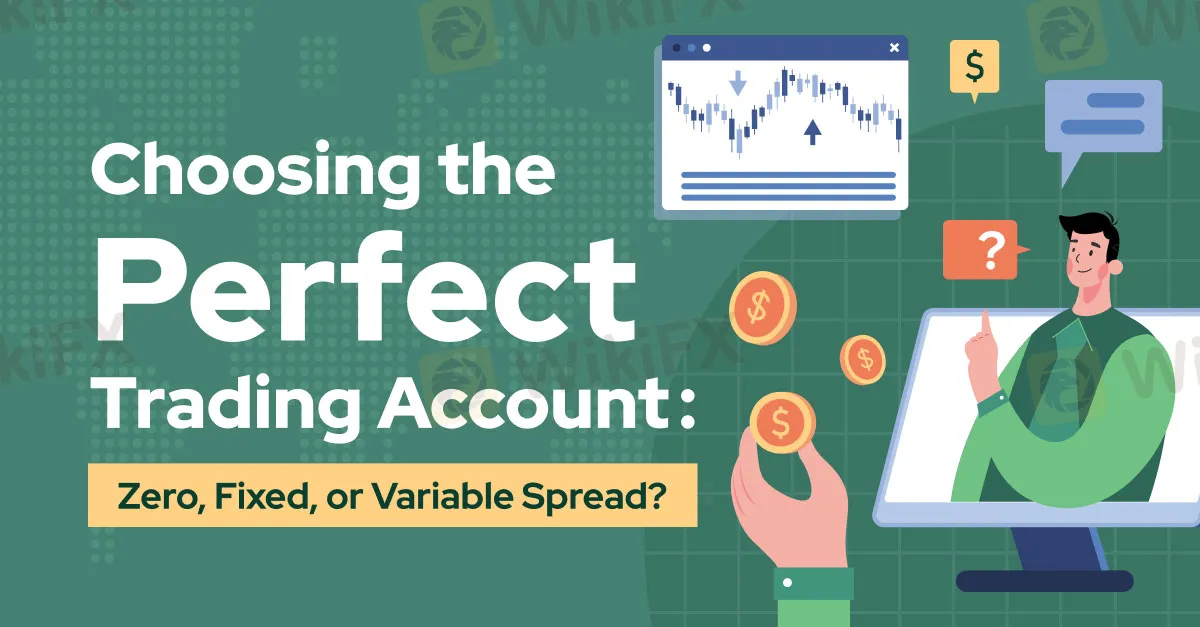简体中文
繁體中文
English
Pусский
日本語
ภาษาไทย
Tiếng Việt
Bahasa Indonesia
Español
हिन्दी
Filippiiniläinen
Français
Deutsch
Português
Türkçe
한국어
العربية
Choosing the Perfect Trading Account: Zero, Fixed, or Variable Spread?
Abstract:Dive into the intricacies of zero spread, fixed spread, and variable spread accounts, but remember: the real cornerstone of successful trading lies in choosing a reliable broker.

In the world of online trading, choosing the right type of trading account is crucial for optimizing your investment strategy. Three primary types of accounts—zero spread, fixed spread, and variable spread—offer distinct features and suitability depending on individual trading preferences and market conditions.

Zero spread accounts, as the name suggests, offer traders the opportunity to trade without any spread. A spread is the difference between the buying and selling price of a financial instrument, such as a currency pair or stock. In zero spread accounts, traders pay only a commission per trade instead of the spread. This structure can be beneficial for scalpers and high-frequency traders who seek minimal trading costs and aim for quick, small profits.
However, while zero spread accounts can seem attractive due to the absence of a spread, traders should consider that the commission charged per trade can sometimes accumulate to a higher overall cost compared to spread-based accounts, especially for traders executing numerous trades within a short period.

Fixed spread accounts offer consistent spreads regardless of market conditions. Traders using fixed spread accounts are assured of a constant spread for their trades, providing predictability in trading costs. This type of account can be advantageous during times of high market volatility when variable spreads might widen significantly. Fixed spreads can be beneficial for traders employing certain strategies that require stable trading costs and when market predictability is preferred.
However, in calmer market conditions or when spreads are naturally tighter, traders using fixed spread accounts may experience missed opportunities for lower trading costs that variable spread accounts might offer.

Variable spread accounts have spreads that fluctuate in response to market conditions. These accounts reflect the dynamic nature of the markets, offering tighter spreads during times of high liquidity and wider spreads during periods of volatility or low liquidity. Variable spread accounts can benefit traders who adapt their strategies to changing market conditions, enabling them to take advantage of tighter spreads when available and potentially reducing trading costs.
Yet, the variable nature of spreads can lead to uncertainty regarding trading costs, especially during highly volatile market events. Traders need to consider that wider spreads might affect their profit margins, particularly if executing trades frequently or in less liquid markets.

Trading Style: Consider your trading strategy—whether you prefer frequent, short-term trades or longer-term positions. Scalpers might favor zero spread accounts, while swing traders may opt for fixed or variable spreads.
Market Conditions: Evaluate prevailing market conditions. In highly volatile markets, fixed spreads might widen, making variable spreads more attractive. In calmer markets, fixed spreads can offer cost predictability.
Cost Structure: Analyze the overall cost of trading, including spreads, commissions, and other fees. Compare the total expenses across different account types to determine the most cost-effective option for your trading frequency and volume.
Risk Tolerance: Assess your risk tolerance. Traders comfortable with potential fluctuation in costs might prefer variable spreads, while those seeking stability may opt for fixed spreads.
Broker Reputation: Research and choose reputable brokers offering the preferred account type. Consider factors like reliability, customer support, and regulatory compliance when selecting a broker.
Ultimately, the choice of a trading account type depends on individual preferences, trading strategies, and market conditions. Understanding the nuances of zero spread, fixed spread, and variable spread accounts can empower traders to make informed decisions aligned with their specific trading goals and risk appetite.

Selecting the right trading account type is pivotal, but paramount importance must be given to choosing a trustworthy broker. A reliable broker ensures security, transparency, and overall trading experience. To aid in this crucial decision-making process, consider leveraging WikiFX—an exceptional platform offering comprehensive broker reviews and ratings. By visiting www.wikifx.com or downloading the WikiFX mobile app, traders gain access to a powerful tool that assesses broker credibility, regulatory compliance, and user feedback. Empower yourself with the knowledge and insights provided by WikiFX to make informed decisions and trade confidently in a safe and secure environment.

Disclaimer:
The views in this article only represent the author's personal views, and do not constitute investment advice on this platform. This platform does not guarantee the accuracy, completeness and timeliness of the information in the article, and will not be liable for any loss caused by the use of or reliance on the information in the article.
Read more

TradingView Launches Liquidity Analysis Tool DEX Screener
Discover TradingView's DEX Screener, a powerful tool for analyzing decentralized exchange trading pairs. Access metrics like liquidity, trading volume, and FDV to make smarter, data-driven trading decisions.

Doo Financial Expands Reach with Indonesian Regulatory Licenses
PT. Doo Financial Futures, a subsidiary of the global financial services brand Doo Group, has secured regulatory approval from Indonesia’s Badan Pengawas Perdagangan Berjangka Komoditi (BAPPEBTI).

Investment Scams in Malaysia: Telegram Tops Scammers’ List
In the first 11 months of 2024, Malaysia recorded 5,685 investment scams, with Telegram emerging as the most commonly used platform for fraudulent activities.

What Are The Common Types of Unregulated Forex Brokers?
Protect your investments from unregulated forex brokers with these tips. Learn about red flags, scams, and how the WikiFX app ensures safe trading experiences worldwide.
WikiFX Broker
Latest News
Spotware Unveils cTrader Store, Global Marketplace for Algo Creators
Elderly Trader Loses RM2.1M in WhatsApp Forex Scam
Gigamax Scam: Tracking Key Suspects in RM7 Million Crypto Fraud
CFI Partners with MI Cape Town, Cricket Team
Doo Financial Expands Reach with Indonesian Regulatory Licenses
WikiFX Review: Is IQ Option trustworthy?
5 Questions to Ask Yourself Before Taking a Trade
Quadcode Markets: Trustworthy or Risky?
Avoid Fake Websites of CPT Markets
Webull Canada Expands Options Trading to TFSAs and RRSPs
Currency Calculator


